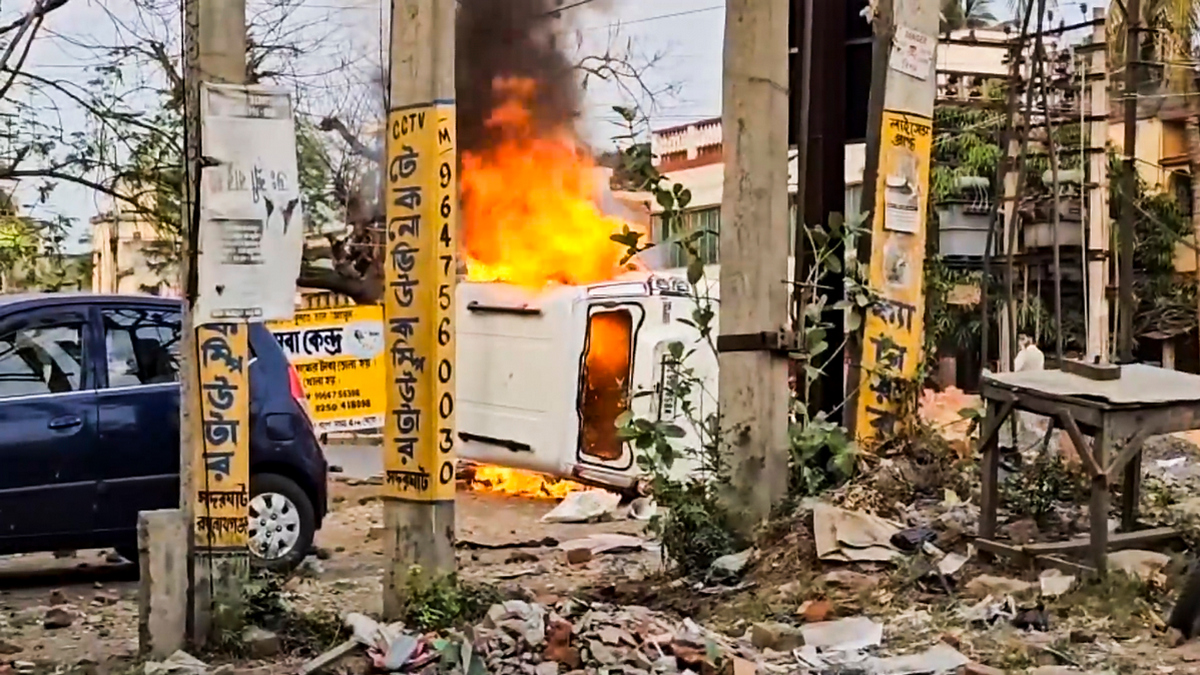West Bengal has been rocked by violence these past few days.
At least three people are dead and over 150 people have been arrested since violence triggered by the Waqf Act broke out on Friday.
Now, there are reports that Bangladeshi miscreants may be behind the violence.
Chief Minister Mamata Banerjee has said that the Waqf Amendment Act will not be enforced in the state, while the BJP has taken the TMC to task over the violence.
But are Bangladeshi miscreants behind the Waqf violence? And what happened?
Are Bangladeshi miscreants behind Waqf violence?
According to India Today, the initial probe of the violence in West Bengal has revealed that miscreants from Bangladesh are involved the violence.
The outlet also quoted sources as blaming the Mamata government for failing to monitor the movements of these miscreants.
News18 quoted intelligence sources as saying that groups like Jamaat-ul-Mujahideen Bangladesh (JMB) – a militant group that works with the Lashkar-e-Taiba (LeT), Harkat-ul-Jihad-al-Islami (HuJI) – may have been involved in the violence.
These groups may have provided arms, given training, and spread propaganda across Bangladesh border routes and the Sundarbans delta.
NDTV reported that these miscreants were supported by local elements.
The situation worsened when the infiltrators went out of control.
An intelligence input from the Border Security Force (BSF) also pointed the finger at the terror group the Ansarullah Bangla Team (ABT) for the riots.
Impact Shorts
More ShortsAs per the report, both these groups – which are banned in India – allegedly conspired to spread violence using their sleeper cells in India.
Both were taken off the banned list in Bangladesh by the interim government of Bangladesh, led by Nobel Peace Prize winner Mohammad Yunus.
The leaders of both groups have been released from jail.
The report claimed that the two groups had been instigating local youths for quite some time.
The members of the group made several video calls to the youths living along the border areas of Murshidabad.
These youths were aged between 12 and 25 years.
The BSF said its assessment of the violence-hit areas has found that the opposition to the Waqf law has links with Bangladesh.
In the BSF’s intelligence report, it has been said that the fundamentalist organisations of Bangladesh are involved in instigating the anti-Waqf law movement in Murshidabad, West Bengal with the help of their sleeper cells.
BJP slams Mamata
Union minister Kiren Rijiju on Tuesday slammed Mamata.
“How? How can she say she will not implement it? She is sitting in a constitutional position and the law is passed by a constitutional body, then how can she say that she will not follow something that is constitutional?” Rijiju asked, as per The Times of India.
“The CM is visibly inciting violence by asking people to protest and saying that she will not follow the law passed by Parliament,” Rijiju added.
Uttar Pradesh Chief Minister Yogi Adityanath too took on Mamata.
Adityanath said “Bengal is burning” and its Chief Minister is “silent”. He also said “danda” – meaning stick – is the “only treatment for rioters”.
“In the name of secularism, they have given freedom to rioters. The government is silent. Such anarchy should be controlled," Adityanath said.
Adityanath claimed that the Congress and Samajwadi Party had not addressed the violence in Bengal. “They (rioters) are issuing threats after threats. They are shamelessly supporting what happened in Bangladesh. If they like Bangladesh, they should go there. Why are they being a burden on India?”
Mamata has called for peace and for people not to exhibit ‘irreligious behaviour in the name of religion,’ as per The Times of India.
What happened?
The Waqf Act has become a major issue in Bengal.
As per India Today, the state has over 80,480 Waqf properties.
It is second only to Uttar Pradesh, which has 2.2 lakh Waqf properties.
At least three people were killed and hundreds were rendered homeless in communal violence in parts of Murshidabad district, mainly Suti, Samserganj, Dhulian and Jangipur, on April 11 and 12 during protests against the Waqf (Amendment) Act.
Fresh incidents of Waqf law-related violence rocked Bhangar area in West Bengal’s South 24 Parganas district on April 14.
This, as police claimed the law and order situation in the previous riot epicentre of Murshidabad remained largely under control.
The Calcutta High Court recently ordered the deployment of central forces in violence-hit Murshidabad district.
Two petitions in the Supreme Court have sought a court-monitored probe into the violence in West Bengal over the newly-enacted Waqf (Amendment) Act.
One PIL was filed by lawyer Shashank Shekhar Jha seeking the Court to set up a special investigation team (SIT) to probe the cases of violence.
Another plea was filed by advocate Vishal Tiwari seeking the constitution of a five-member judicial enquiry commission headed by a former Supreme Court judge to investigate the violence in the State.
One of the pleas sought a direction to the State Government to file a report in the top court on the violence aside from the directions for protecting people’s lives and properties.
With inputs from agencies


)

)
)
)
)
)
)
)
)



